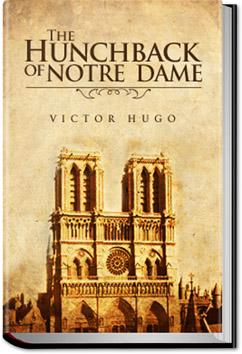
(This review is about one of my new favorite novels, Notre-Dame de Paris, and the subsequent movies it ended up generating. As I will show, some were really good, others not so much, but none have been able to achieve what the book did).
WARNING: Spoilers to follow. I will try to be as vague as I can, though.
I've been a big fan of Victor Hugo ever since I read his amazing(and arguably his best known work) Les Miserables back when I was fifteen(yes, I was a fan of it before the movie was being advertised for; I do love the musical and the movie was very good), and I always meant, at some point, to read his other 'big' novel "Notre-Dame de Paris", more commonly known by it's English title "The Hunchback of Notre-Dame".
However, I wasn't fervently going to go after the book and read it, but then I heard the song "Hellfire" from Disney's rendition of the story (now that I've read the book, I'm quite surprised they chose that, but I'll go over that more below) and I was as inexplicably intrigued like Dom Claude Frollo was when he first saw Esmeralda dance; the song was surprisingly dark, had a beautiful sound with haunting lyrics, and, now that I've read the book, is actually a very good song for the character.
Fascinated, I listened to the song and slowly became obsessed; I read posts describing the meaning of the song; I tried to learn as much as I could about the character of Frollo (and Esmeralda) and, as I did, I began to strive toward getting a hold of the book and the Disney film(which I never watched growing up, oddly enough, since I thought it looked boring; how silly I was).
Before doing either of these, though, I ended finding one of of the live-action versions of the film(the 1997 version) and was enchanted. The story line, which I'd perused about on the internet, drew me in and the characters of Frollo and Esmeralda struck a very strange resonance with me and made me think. I wanted more of the characters, of the plot, and I endeavored even more strongly to read the book and watch the many film versions and see which one followed the book the closets(I hadn't read the book yet, but I knew enough to know if it was book accurate or not). Over the last month and a half, at least, I've been obsessing over this storyline(especially that of Frollo and his complex character) and now, after watching all(except the silent version) of the films and reading the book, I'm ready to express that obsession on paper(figuratively speaking), since I've been, to be honest, geeking out over this book(and Les Miserables; book and musical) like I do over Star Wars and my other fandoms :D. Yes, it's THAT good :D. It has made me even more determined to visit France/Paris and now I am one of those weird people who is more interested in visiting Notre-Dame than the Eiffel Tower.
P.S. I know the term gypsy is a term not liked by the people it was given to, so I will try and not use the word that much, unless I'm talking about it in context of the story, where it is used(more so in the movies, than in the novel, since in the version I read, it was hardly used; instead, she was called a Bohemian or an Egyptian, when they referred to her race).
Now, onto the review(s)! :D

The Novel(which is, of course, the best) -
The book...okay, wow, what a well written piece of literature. The writing is beautiful, raw, and exactly the style of writing I love to read. Yes, Victor Hugo has a bad habit of going off on 'describing tangents' (they do apply, but they do get tedious to read; luckily, they aren't as numerous in this one as they are in Les Miserables), but his writing in regards to the plot-line is always amazing and easily readable, even today, which is quite remarkable since this book has quite a lot of "Old English" in it(I guess you would call it Old French in it's original language).
Since I want to talk about the positives more than the negatives, I'll get those out of the way. One of my few complaints about the book would have to be the English title. It is EXTREMELY misleading, in as it implies that Quasimodo is the story's lead. And yes, while the hunchback bell-ringer is a important character in in the core cast, he definitely wouldn't be the lead of the work- in fact, there IS no main character; the story tells about those who live in and around the great cathedral Notre-Dame and how they all struggle to live in the harsh world of Paris in the 1400s(though, if I had to pick a main character, I would choose The Archdeacon Dom Claude Frollo or the dancer La Esmeralda, since they are both the main catalysts in everything that goes down over the course of the story).
The setting is very well described and, according to historians, very accurate(since Mr. Hugo lived in the 1800s, centuries after the story takes place), which helps lead credibility to his words. It's also quite interesting when you compare it to his other major work, Les Miserables, and see that things are still just as bad in that story(which takes place in Hugo's time period), what with how the justice system was unfair, how people went to jail for the silliest of reasons, and how the rich got away with everything(hey, that sounds awfully familiar...)
The plot-line, especially when you first encounter it, is exciting, captivating, and very dark(though, there is surprisingly some humor in the book as well). Hugo definitely doesn't shy away from the darker aspects of human nature- in fact, in this book, there are no heroes and really, the villain isn't one individual, it is the wicked side of humankind, the wickedness of the powerful; how greed and uncontrolled emotion can lead to the downfall of even the people of the highest moral character- as Matthew Stover says in his novel "Revenge of the Sith", "the brightest lights cast the darkest shadows". The book starts off kind of slowly, with descriptions about the Palace of Justice and the set up for the Feast of Fools, but once we meet the leads of our story, it all gets rolling and things begin to get intriguing(though, there is that part of describing Notre-Dame and Paris in the 1400s segment...) as we learn about who they are and their back-stories. The story then picks up and doesn't stop until you reach the conclusion which is...well, it's not like the Disney version's ending, that's for certain. It isn't exactly satisfying, but it makes sense and is realistic, especially considering the brutality of the time. And, in the end, it is how the novel has to end for the point to be made.
Another thing of note is- while most authors, when using telling, utilize it childishly, since it's often frowned upon in literary works of fiction; yet, here, Mr. Hugo makes it work, since we need to know certain things about the protagonists before the actual story begins; so, while I tend to hate telling in fiction, I love it when it's done right, and Victor Hugo definitely knows how to do that. And, of course, he knows how to tell an amazing story where all the characters somehow weave together.
As for the characters, they are all extremely fascinating individuals. They all stand out, just like ones in Les Miserables, and will be remembered far after you have finished the book. In fact, one of the characters, that of the Archdeacon Dom Claude Frollo, is one of the most complex and riveting characters I've come across in fiction.

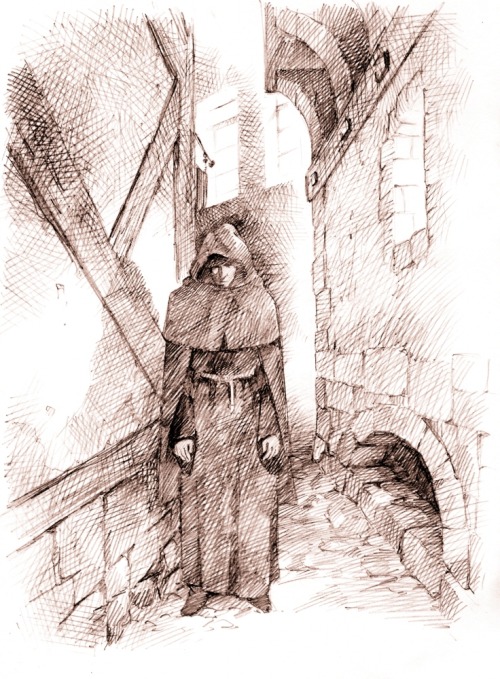
If you have watched the Disney film, you most likely know of Frollo(a Judge in the Disney film) as a villain and, in that movie, yes he definitely is one. But in the novel.....things aren't nearly as black and white; in fact, I don't know what he is- good, bad, both? We are introduced to the character(well, not completely, you briefly see him earlier on before the flashback to the past happens in the narrative, but it wasn't that much) as a young child, whose parents had decided would join the clergy, and was thus, sent to university to learn. We learn that he was a serious, studious boy who was a quiet, yet what you would call a "Straight A", student, never participating in what other boys did, such as revolutions and silly antics, preferring his books and knowledge. As we read about his childhood, he appears to us readers as a likable character. While I love naturally passionate, loud, boisterous characters, I also love characters who are quiet and brilliant like he was; I also liked that, even though he was raised in a university by teachers and scholars, and most likely never saw much affection coming his way(since he barely knew his parents and didn't have a close mentor), he was capable of great compassion, passion, and even empathy, which proves to me that he wasn't what you would call a psychopath(a term I've seen used a few times for him).
We see the love for his brother, Jehan, whom he raised, quite evidently in the text. ("he was more than a brother to the infant; he became a mother to him": p. 133) It's even apparent when he first finds his brother after he rushed home when he heard his family had fallen ill(his parents had died the night before he arrived). In fact, he cared and loved for his brother entirely and with everything in him, which is more than many people can say, and he had quite a lot of patience with the boy, especially considering how he turns out(a party-er, drinker, easy-going, waster-of-money). In fact, he spoils the boy like a parent would their child(there were times I was impressed with how he put up with his brother demanding money, even though Jehan knew his older brother, who was in charge of their parents estates, still had debts to pay off). And, along with the love, care, and patience he bestows upon his little brother, he was also the only one to take pity on the deformed child(you all know who I'm talking about, right ;) ) abandoned in the foundling box at the church, whom everyone else wanted to BURN, and adopt him and raise him like a son(which shows empathy- since seeing the child made him think about his brother). With what we're given, even if he is really obsessive about knowledge(he, in fact, turns to alchemy and wants to create gold), he, at first, seems like a normal, kind man, a little aloof maybe, but still a decent human being And thus, I instantly was able to like his character, even though I knew what happened with him later on(in fact, that's what made him interesting to me in the first place). Then, even though I already knew, it is slowly revealed to the readers, the conflicted man inside the austere continence(in the present, anyway); we are given hints and, even though I knew, I enjoyed picking up on the clues as to what was going on within him, and why he was so agitated. As you most likely know(if you've seen the Disney version), his inner conflict is that, he loves(well, that's debatable, and one that I'll get to below) a young Bohemian dancing girl named La Esmeralda. And, as a Priest, this is seen as a terrible thing to him and he can't, and maybe even doesn't want to, know how to handle his feelings for her. This is where his character's main interesting factor lies- his struggle between God and Esmeralda is raw and painful, and it's very hard to see his descent into madness as he tries to resist his feelings, yet cannot,since, as he was raised in an university by professors and tomes in the library, he had no understanding how feelings and emotions and care were supposed to work and be handled. In fact, he seems to almost slide into a child-like state throughout the book, trying so hard to hold onto what he wants he ends up breaking it. No matter how much he begs, pleads, throws tantrums(yes, he kind of does that at one point), cries, entreaties, threatens, she will never care for him. His vast emotional immaturity, as well as his regression into madness, is shown in how he handles things; instead of doing the adult thing of actually talking civilly to her about how he feels, he, inadvertently, gets her arrested and, from then on out, tries to save her, but a part of him, a wicked side that begins to grow within him and grows bigger and uglier the farther we go along, one that terrifies him, seems to stand in the way of his innate goodness. This terrible wicked side of him would rather see her die than see her with another, yet, even towards the end, I feel he wanted to be a hero to her, that good part of him still there in the insanity into which he had slipped(and his insanity is, nicely, shown to have culminated over a course of months, growing from lust/love that he feared to an all-consuming obsession that he, so he thought, could not escape, do to his blind belief in "fate"). And, even when he was completely off the deep end(and I mean, he WAS quite mad), he still shows his love for his brother, and it's heartbreaking to see how it all ended; though, at the same time, it humanizes him even at his darkest, which I think was appropriate, since the story showed the good and bad of everyone. The allusions to Cain and Abel in the text were quite powerful and saddening, and were one of my favorite parts in one of my favorite chapters of the book.
His obsessive 'love' for La Esmeralda is the catalyst to the story and his character is, in fact, the driving point for the entire plot(with some help from the other leads which are Esmeralda, Quasimodo, and Pierre).
In the end, after seeing everything that he does(and how hypocritical, and at times violent, he is), it is up to the reader(or the viewer, when watching a film) to decide for themselves the various questions pertaining to his character. Was he a good person, bad person, or somewhere in the middle? Did he love Esmeralda, think he did, did he hate her, or all three? The answers to those questions I am still debating, but, as of now, I believe that number 1- he was a good person who was stifled in a time period that was cruel and in a time and place where emotions were squashed and not allowed to be felt and released, and, thus, slowly, through his own inability and weakness, went insane because of feelings he didn't know how to handle. And number 2- I think he was close to it, and he wanted to, but I don't think he truly did love her. But what about the last bit of the book, what happens with his character in those last few chapters- do I think he was actually wicked at the end?
I do not know.
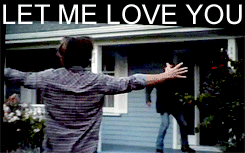
Frollo in one gif
If I were to choose a lead for the story, I might also say La Esmeralda, along with our aforementioned Archdeaon, since she is at the center of the plot; the focal point of, mostly unwanted, interest and attention from several of the other characters throughout the novel(from "love" to hate).
Victor Hugo gives us a surprisingly realistic individual in Esmeralda, especially since she acts like the teenage girl that she is for the most part throughout the narrative- sometimes shallow, sometimes kind, sometimes both(the fact that she's a real character is a testament to Hugo's writing, especially in a time when most female characters were boring and extremely unrealistic). I also enjoyed how she is painted as a sympathetic character- I could definitely see many authors villainizing the poor girl, but, like he does in Les Miserables, he shows women, from various backgrounds and social standings, in a light that paints them as people instead of caricatures.
As I mentioned before, a large chunk of the narrative of the book revolves around various characters feelings for Esmeralda and the most prominent of these feelings, at least among the leads, is love(or lust, depending on who we're addressing). We, of course, have the Archdeacon of Notre-Dame(Dom Claude Frollo) who falls for her the instant he sees her(and hates himself for it); along with him are a destitute poet named Pierre Gringoire who Esmeralda marries to keep him from hanging, Quasimodo who cares for Esmeralda because she showed him kindness(one of the very few to have done so), and even the slimy Captain Phoebus who only wants to have a one-night stand with her before he marries another women(and is, consequently, the only one to whom Esmeralda returns actual romantic affection towards).
And, sadly, even with all of these men showing a romantic interesting in her, and all of them declaring it at some point, none of them truly love her enough to go above and beyond for her. Pierre Gringoire, who she married as I said before, to save him from hanging, does show interest in her at first, but once she shows little to no romantic interest in return, his care for her virtually vanishes, and he soon comes to care more for her goat than her and is too cowardly to save her when he could have. Captain Phoebus, while not evil per-se, is still a royal jerk and doesn't lift a hand to save her when he also easily could have. Quasimodo's love for her is probably the most pure, but I still wouldn't classify it as love- he almost lets something very bad happen to her, but thankfully she takes matters into her own hands; instead, I'd call it an infatuation mixed with an appreciation fir the kindness she showed him(he DOES save her from hanging, so he gets props there). Even the Archdeacon, whose 'love' for her is the biggest and the hardest to contain, doesn't fully love her; I think he truly thinks he does, and I believe a part of him wants to love her completely and do anything for her, but the childish, vengeful side of him gets in the way of him being fully able to save her like the good part of him wishes he could. In the end, only one person shows enough love for her to try and protect her, but folly, and maybe even fate, intervenes.
Many people I have noticed were annoyed with her obsession with Phoebus, who was obviously an asshole, but one must remember that she isn't a grown up like the other characters in the story- she's only sixteen and, often times at that age, physical beauty is what is most important. And, of course, she doesn't know as much as we do about Phoebus, so we musn't judge her that harshly. I've also heard people say she was so stupid and selfish/mean that she deserved to die, which I thought was quite horrible. Sure, she is rude a few times, but she had just been through a lot of crap, so I can understand that(and she's a teenager, once again). And the only time she did something extremely stupid/brainless was towards the end(now THAT was face-palm worthy). But, she redeems herself for her bad behavior by not putting up with people's crap and taking care of herself when no one else will(like when she grabs the SWORD! >:D One of the best bits, in my opinion).
However, I still enjoyed her character and how well she was crafted.
Besides these two great characters, are the titular(in the English one, anyway) character, Quasimodo, who is probably the best known. While not my absolute favorite character, he still a good one and is probably the closet thing we have to a hero in the book- however, several of his actions take that title from him(as well as him being not as large a character as the English title would have you believe).
Another character who the movies often-times leave out(or get wrong) is Pierre Gringoire, a poet who, while a coward and quite selfish, does have his heart in the right place and creates a sympathetic figure(even when you want to smack him for being a butt at times).
There is also Phoebus, a Captain of the guard, who is a womanizer and, while beautiful(well, according to the book) on the outside, is quite vile and selfish within; Others include Jehan, Claude's younger brother, who is a wild, money-waster and, while a little prat at times, is still endearing and easy to care for; and, of course, there is the goat Djali who, while friends with Esmeralda, is also her downfall.
Overall, the book is definitely the best way to get the entire story; if you love Les Miserables, one of the movies, or just appreciate good literature, I would definitely recommend you give it a read; the stories, the characters, will haunt you for a long time after you close the last page(and I'm not just saying that to sound cheesy, I mean it; it did so for me).
Favorite chapters
"Lasciate Ogni Speranza"
The Little Shoe
Claude Frollo's Cell
Utility of Windows Looking Toward the River
A High Fever
A Priest and a Philosopher are Two Different Persons
The Goblin-Monk
The Two Men in Black
The Foundling
Claude Frollo
The Dog and His Master
The Dangers of Trusting a Goat with a Secret
The Broken Jug
A Wedding Night
The Poet Puzzled
Since Victor Hugo's novel is a classic, there have been a myriad of film adaptions done of it. And, of course, like most movies based off books, none of them have been quite right, whether it be in plot-constructions(like leaving out the mother of Esmeralda plot thread completely out, which they virtually all do) or in how it's characters are portrayed; very often, struggling to find a more black and white retelling, certain characters will be shown as more evil or more good than they are in the book, something which drives me CRAZY, since the story has no heroes, unlike Les Miserables; that's the point of the novel for me-how far people can fall, while his later work of Les Mierables is how high they can rise. And sometimes, due to the depressing nature of the ending, characters that die in the novel live and, sometimes, are given happy endings which, to me, cheapens the entire point.
Another thing many of the movies do is age the characters which, while I do find it a bit annoying, makes sense, since, in our world, a thirty-six year old liking a sixteen year old would be considered creepy and wrong(while back then, it wouldn't have been a problem, since she would have been considered an adult by that point). For me, watching it wouldn't be a problem since I understand the viewpoint on what was right and wrong was totally different, and she is at least sixteen; if she had been younger, it would have bothered me regardless(it would definitely bother me a whole lot more in a modern day setting since we now know it's wrong). However, the movie makers will want the viewers to be focusing on the story and the characters, and not the age difference, so I can get past that(for the most part).
Below is a list of all the film versions I have seen(which is all of them, I believe, except the silent one made in the twenties which I plan on watching at some point later and the French, modern-day, comedy which I've only seen bits of). If the version on Youtube, I'll post a link below the review :)
Oh, and a word of warning. The book is an adult book, so, besides the Disney adaption(and the 1939 one to an extent), all versions will have some inappropriate content in them.
1939 -
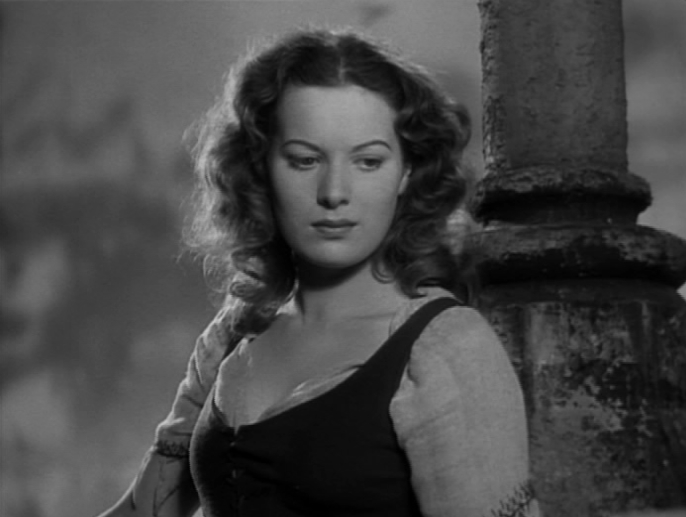
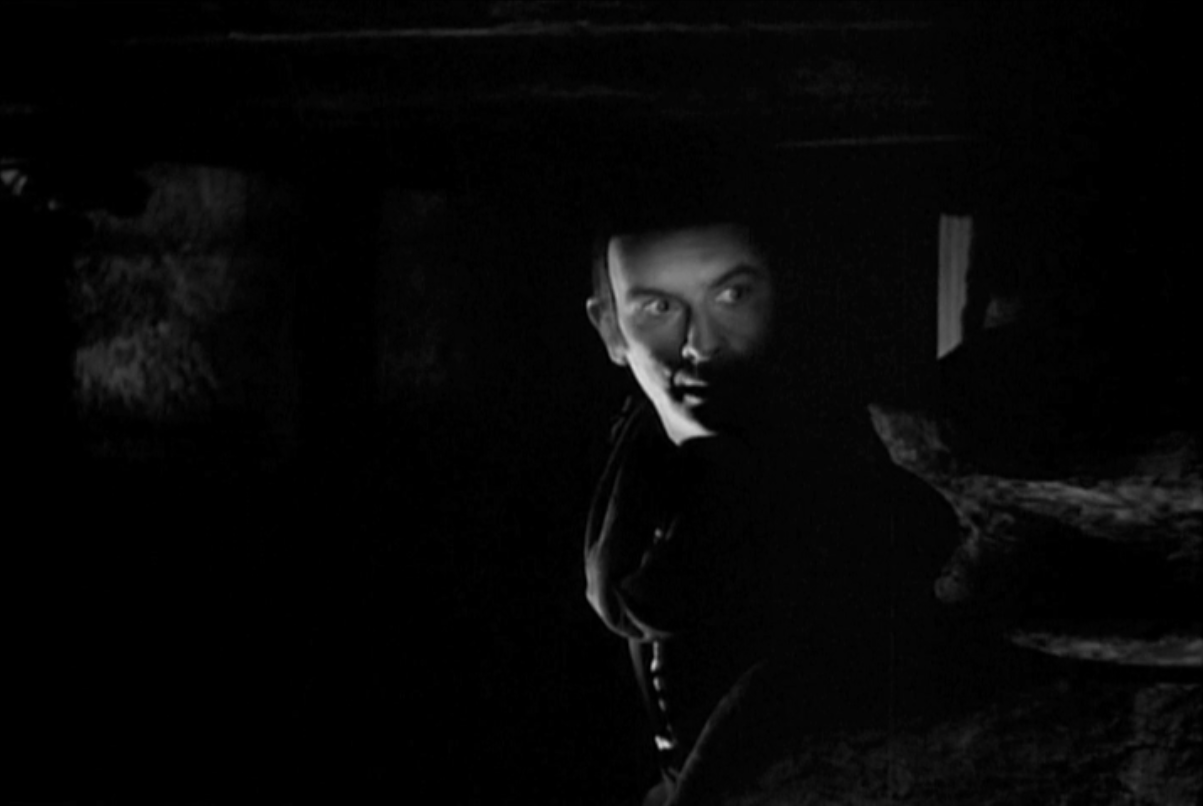
Probably one of the best known of the film adaptions- besides the Disney one -and the one every other version is compared to(and is often where certain plot threads are drawn from in later film versions).
It, like it's silent movie version counterpart(and which is copied in several other versions) separates the character of Frollo into two different people- in this version there is Claude, who is a good priest, and the character that lusts after Esmeralda, is, instead, his younger brother Jehan(who, in the book, didn't know Esmeralda personally, and was, in fact, the same age as the girl). Overall, the movie is a good one. Yes, it could have used a lot of polishing, but for a film made in the late thirties, it does a reasonably good job, and the set can still hold it's own today. I also liked the grand scope of the film- the black and white aspect of the film also lent itself well to the story; showing darkness and light in a way color-film often lacks.
The acting is all right for the most part. Sir Cedric Hardwicke, while not given as deep of a character as that in the book(which is the scripts fault), does an impressive job with what he's given and I enjoyed his performance- he is stately and in control the entire time(even when he is expressing his feelings or covering his face with his arm in guilt), which was a superb contrast to the austere, yet passionate, character we know him as in the novel. I however, do wish he had been a priest instead of a judge, since it makes his 'oh my gosh, I like someone, this is SOOO bad!' a little less understandable. But besides that, he gives a great performance, makes you feel for the character, and isn't actually evil, which is a nice touch. Charles Laughton also gives a memorable performance as Quasimodo; while not my top favorite in the role, he still does a good job and many of his lines are perfectly said. Edmond O'Brien also gives a wonderful and likable performance as Pierre Gringoire(and he's easy on the eyes as well, so that's a plus). Walter Hampden, who is basically playing the Archdeacon Claude Frollo's character without the feelings for Esmeralda, does nicely in the role, playing a kind priest(I did like how they showed the priests as nice in this film, especially when they were being kind to Esmeralda, even if it isn't book accurate, since other priests aren't shown in the novel), and a good brother; the brother-dynamic in the film is great and I was very glad to see it shown since it's left out, or glossed over in most versions(even if it is a bit skewed in this version).
My main beef with the acting in this movie is Maureen O'Hara's performance as Esmeralda. I felt bad about it, but I just couldn't get on board with it. Yes, she's really pretty, but she doesn't look right to start off with. Yes, the character can be played by a Caucasian actress(though I prefer it when she's not, especially if they aren't including the mother subplot), but she has to at least as to look like she could pass for a Romani/Bohemian girl(in fact, I could pull off the look better, and I'm a pretty pale person), especially since the film is about the Gypsies being treated cruelly by France, and how Esmeralda wants to change that(and all the other people we see who are Gypsies actually look it, so that makes it pretty weird). She was, however, the closet to the actual characters age(she was around 18/19 when she played the role), but she looks a lot older than that, so I don't really count that as a positive point. Besides her look, I really didn't like her acting- her face was stiff a lot of the time, and sometimes it didn't go with what she was saying. Her voice inflections were also really off, and it made it hard for me to like her performance.
As for the plot, it is definitely different than the novel; many of the things are toned down and it's nowhere near as dark as the book. Also, the plight of the Gypsies and how they were treated is a big plot point in the overall narrative of the film, and while it's not book accurate, I did like it since it's an important issue, and I found it impressive that they addressed racism in that time. Also, a quote said by Esmeralda in this film version about how her people can't be witches since "if we did have magic, don't you think we'd use it?" is such a good and valid point; so many blame the poor and the outcasts for things that are as ridiculous as back when they said such people were witches. The king character, while a nice guy, was quite inaccurate, since the king, in the novel and in history, wasn't a good person. At all.
So overall, it was a good film, but it was lacking in some areas, and it wasn't very accurate to the book. I did like it's messages, though. I would recommend giving it a watch since it's a film classic.
(Hey fans of the Disney, doesn't his hat look awfully familiar? XD)
1956-

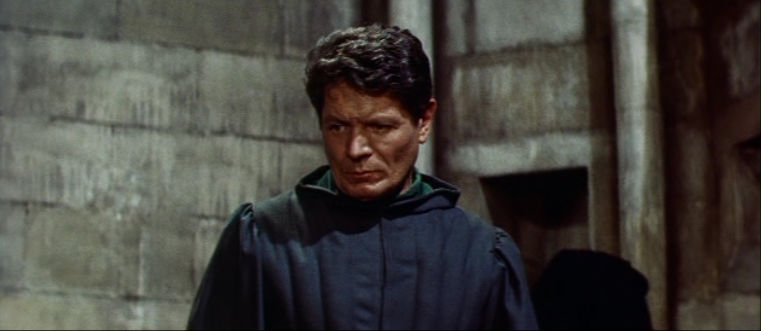
This version made in France in the 50s, has to be one of my favorite versions(3rd or 4th). It's, for the most part, very book accurate, and the actors are all very good. Even though it was made in the fifties, it still holds up rather well today, with its sets and costumes appearing realistic(apparently Esmeralda's costume in this one is historically how a Romani woman would have dressed back then).
The acting in this one is really good. Alain Cuny is one of my favorite actors to play Frollo- he plays the tormented priest exceedingly well, especially with the brooding and the silently watching, which demonstrates good acting in showing instead of telling; his performance was actually one of the few where the characters' affection for Esmeralda seemed closer to love(at least, most of the time). The character is also close to how he is in the book- he is a priest, he studies alchemy, and he already has seen Esmeralda before the film starts. Sadly, he is underused in the film and his character isn't as fully developed as he could have been(one big thing is that there really isn't a confession scene, which is important to the overall plot). However, this Frollo does have the best "Sequel to the Key to the Porte Rogue" sequence and is the only one of the film versions to see her in her white gown walking amongst the pillars at night, so that's some bonus points in its favor.
Gina Lollobrigida is also a very good Esmeralda(one of my favorites); she's a fantastic actor and, along with being very pretty, gives her character a great personality and a liveliness that makes it quite understandable that people would be drawn to her. She might be a tad to old for the role, but she owns it and makes it believable, so I can overlook it. Also, she actually looks Romani, and is barefoot(which is something most film versions forge to add) and she also sings as well as dances, which is another brownie point for this work. This film also has a good and likable Pierre Gringoire who is pretty close to how he is in the book, as well as a good Phoebus; he's good enough looking for you to understand why Esmeralda would like him, but disgusting enough in personality that the audience is repulsed by him. This version even had Jehan (like he is in the book) in it which was great! Really liked his character in this one.
Sadly, this film has the worst Quasimodo; I don't think it's the actor's fault completely(though he wasn't right for the part), but rather the make-up department and the script. To begin with, he's not even deformed like he's supposed to be- just a slight curve in the back and a sort-of disfigured face. Plus, his character is just made unlikable, especially towards the end where I got rather annoyed with him(and I don't in other versions).
As for the plot, not only is it book accurate, it also has some of the best adaptions of certain scenes. Not only does it have the best "Sequel to the Porte Rogue" sequence, it also has the best Esmeralda trial and one of the best 'stabbing' scenes. The trial, while different from the book, is very good and gave Alain Cuny a chance to show off his acting skills as well as Frollo's affection for Esmeralda. The stabbing scene, and what led up to it(as well as it's aftermath), was marvelous. Frollo screaming in the upper room(while the tenants of the house are a bit freaked) about Esmeralda's, and his, salvation/souls has to be one of my favorite scenes in the film and one of the best Frollo-sequences to date. The whole thing regarding that segment of the story was very satisfying. The ending, however, is where it gets a little tricky. It is almost painful to watch since, unlike in the novel and the other film versions, what happens could have been averted. Since I didn't like Quasimodo in this version, I think that could have also played into the near unwatchability of the climax for me. In fact, when Quasimodo screams the "it's your fault" line at a certain character, it actually doesn't seem that way or make sense due to how the climax played out. However, while one of the deaths is done incorrectly, it at least happens and the very, very ending is perfectly done and is the ONLY version to have "The marriage of Quasimodo" chapter in it(the last chapter, FYI).
Here's part one of the original movie in French(with English subtitles); it is much better than the English dubbed version, since a lot of the original meaning is lost. So, if you do watch, ONLY watch the one in French.
1977-
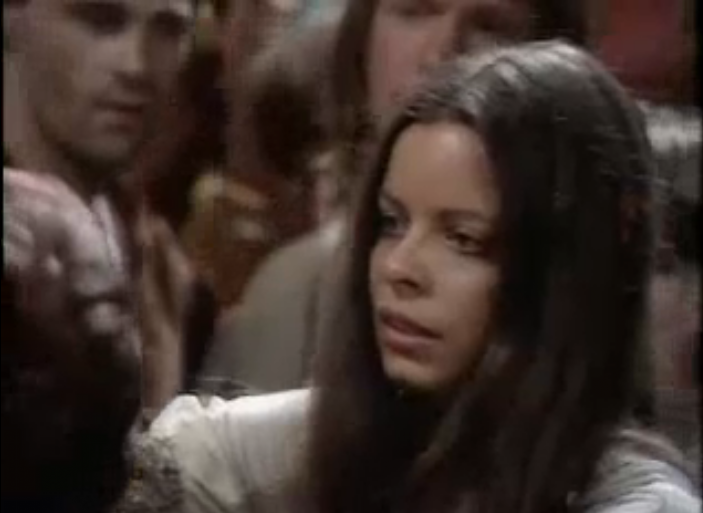

While not my absolute favorite version, it's still a good one and, for the most part, is the closets to the book out of all the adaptions I've seen(apparently this was a TV series and not a movie, but it watches like one). Sadly, while this one was the most faithful to the original story, it...lacked the spirit that made the book so engaging. Don't get me wrong, it's a good film, but the acting and the scripts weren't as good as they could have been; there are moments where it's really wonderful, but it just didn't come all together, which is a shame.
Kenneth Haig, while not the best, is probably the best actor in the film and does a solid job as Frollo. While not as emotional as he could have been at times, some of his lines are dead on perfect(though some fall short), especially when he's saying he can save her when she is doing penance. He also had a great "goblin monk" look and during the stabbing scene, he had a great 'crazed expression'(probably one of the best stabbing scenes, except that it looked like Esmeralda was being raped and thus made me think "yes, STAB HIM Frollo!" during the scene, which wasn't what happened in the book at all. Phoebus was a jerk, but he didn't do that to her). This version of Frollo is also one of the few to practice alchemy and to have his brother Jehan play a part in the story(and this Jehan is really well done!).
Michelle Newell, while not the best Esmeralda acting wise, she is probably the closest to looking how the character is supposed to be- she looks young enough to be a teenager and she has the right look to actually pass for a Bohemian girl. She also acts a lot like the character, though the script tends to focus more on her negative attributes instead of showing a balance between the two. However, she was the only Esmeralda to grab the sword during the "Sequel to the Porte Rogue" scene, which was awesome, so I can ignore it! XD Interesting fact- the actors playing Frollo and Esmeralda actually have the same age difference as the characters in the novel(which is twenty years apart, approximately).
As for the other actors, they are solid but there isn't anything stand out; the Gringoire is the closest to the book and the actor pulls him off well enough, as does the actor who plays Phoebus(pulls off the lecherous bad man in a very believable manner). The actor playing Quasimodo is also good, but he doesn't blow one away like some of the other actors who have played him have.
Excluding the somewhat-off acting, there are several things in this movies favor. It is the only one to show Frollo and Gringoire(the latter reluctantly) saving Esmeralda by stowing her away from the cathedral; it isn't as powerful a scene as it is in the novel, but at least it's there. It is also one of the few to have a "Lasciate Ogni Sperana"(cell/confession scene) segment which I appreciated, even if it wasn't nearly as good as the book(there should have been much more emotion from Frollo, which I was disappointed by; I wanted to see him bash his head into the floor....)
Here's part one for this version :)
1982-
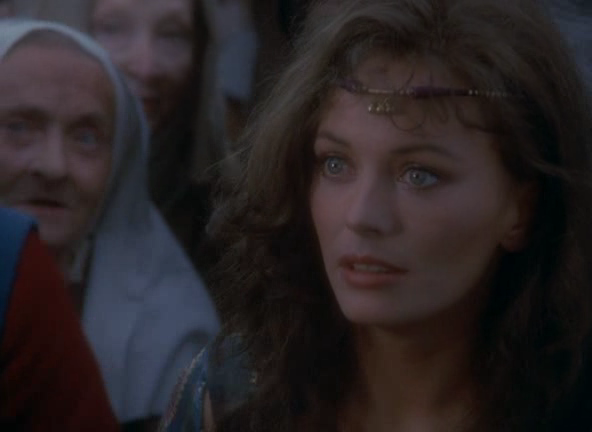

Okay, so this movie wasn't perfect, but OH MY GOSH WAS IT GOOD! Along with the 1997 version(which I'll get to below), this has to be one of my absolute favorite adaptions. Even though I know the story back to front, it was still so engaging, and I couldn't wait to see each moment slide by.
First of all Derek Jacobi(who plays the old Master in the Doctor Who episode Utopia back in season 3), along with Richad Harriss, has to be one of the best Frollo in any film version! :D His voice inflections are PERFECT, as are his facial expressions, and even though the script brings some inconsistencies towards the ending(which I'll go into further depth below), he somehow manages to get the character right- he balances the childishness, the vulnerability, and the violent passion of the character with a gravitas very few actors exhibit(everything he said, I believed). Yes, the movie makes his character go through the moments that took months to get to in the book in only a matter of days, but he makes it work well enough you can ignore it. His Lasciate Ogni Speranza(confession/cell) scene was beautiful! It wasn't as good as the book, of course, but it was probably the best we've seen yet(along with the sort-of scene in the 1997 film); I just wish it could have been longer. I also appreciated that this version showed him adopting Quasimodo, which most film version elect not to show, as well as showing the good side of him(YAY!). It even has a little bit of the "A High Fever" chapter and within that short little sequence we get a very sad moment followed by a sad, yet funny, moment(this movie really makes you feel for him). I do wish they'd had him see Esmeralda dancing(though his reaction to seeing her for the first time was flawless), had him going to rescue Esmeralda at the end, included Jehan, as well as showing his descent into madness a bit more gracefully(but it's a two hour movie, so I can definitely understand it not being as smooth as it was in the book). So, basically, Derek Jacobi gives us a performance of filled with talent and magnificence, showing us a broken man(oh my gosh, it was sooo good!!) who was desperate and very sympathetic(as well as quite funny at times). On a brief side note, his stabbing scene was really good too, as was the trial sequence.
Lesley Anne-Down, while not the right age(or having the right look) gives a surprisingly well-done performance as Esmeralda. Even though her mature look takes away from the naivety/innocence of her character, she manages to own in impressively and is, in fact, one of the best actors to tackle the role. She worked really well with the cast, which had some pretty high profile actors in it. Her acting in the confession scene was great as well, probably her best in the entire film. I wasn't expecting much from her going into the film, but she surprised me and for that, I am thankful. I only wish they had included her more outgoing nature, since Esmeralda isn't a timid person in the book.
Anthony Hopkins(Odin in Thor, people! :D) does a very impressive Quasimodo; in fact, it was one of the best performances of the character I've seen. I'm usually not that interested in his character, but Anthony Hopkins did such a good job, that I was. I cared about him, I enjoyed his moments, and it is obvious why this actor is well known today.
As for the other actors, they all did very well too(I don't think there was a weak actor in the cast). Gerry Sundquist gives a marvelous, and enjoyable, performance as Pierre Gringoire(even if the character isn't correct to the book's characterization), I really loved how he wanted to protect her from Phoebus who he knew was a womanizer; he's also pretty easy on the eyes as well, which is a plus XD. The actor playing Phoebus does a good job playing the most disgusting, vile version of the character yet(I honestly don't see why Esmeralda likes him so much; let's just say, that if that guy hit on me, I'd physically HIT him).
Overall, the rest of the movie was beautiful. Many of the lines are taken directly from the book(YAY!!) and many of the added bits of humor and emotion were really innovative. The other priest that follows Frollo around is a nice touch, since you wonder...how much does he know about the Archdeacon and his infatuation since it's kind of obvious; I also loved it when people would walk in on Frollo praying/crying, as well as some of Frollo's little quips, and Clopin's line about Frollo not harming "a hair on your head" to Esmeralda. If you know the story...SUCH irony!
However, this film does have its downsides. First off was the ending. Seriously, it was going so well and you to do THAT? The last fifteen minutes are so are just...not book accurate and bother me...a lot.
First off, they try to make Gringoire the hero of the story, but having him be the one to initiate the idea to rescue Esmeralda, instead of it being Frollo who bullies the hapless poet into doing it(since in the book, Gringoire is a COWARD!) takes away from the Derek Jacobi's Frollo who, up til then, had been pretty much perfect. I think it was annoying that they did that, but it is the film industry, and most people need a hero, and since they didn't want that to be just Quasimodo, they had to make the cowardly(yes still relatable) character all heroic, as well as somehow having Esmeralda realize that she 'loves' Gringoire(stop trying to copy the 39 version already!); basically, I hated that they reversed the roles for that, since Frollo wanting to rescue her shows that he has some humanity left at the end. Also, the deaths that do happen at the end are all WRONG!
However, this has to be one of the best versions so far and I overall enjoyed immensely. Besides the lackluster(and wrong) last fifteen(or so) minutes, the film is extremely well done and is one, if you're new to the story, that I'd recommend you watch :D (I'd post a link, but it was taken off YouTube before I got into this story, so I rented it. And you should too! :D)
1996(Disney)-
-3.jpg)

First, before I start my review I have to say, WHY ON EARTH DID I THINK THIS MOVIE LOOKED BORING WHEN I SAW THE TRAILERS AS A LITTLE KID!? I can't believe I didn't watch it until a month ago! XP Oh well, I think I appreciate it a lot more since I'm older, and I'm glad I watched it when I did.
You know, to be honest, considering the content, I'm really surprised that Disney decided to make a film of this story(I know they adapted several fairy tales that are quite gruesome, but this book is darker than any of those used). However, even though it's quite far away from the actual book plot line(it's Disney, so expect that), it surprisingly keeps parts of it, and it ends up being one of Disney's best films! :D First of all, the music was BEAUTIFUL!! Such a wonderful, wonderful score! Definitely one of the best Disney has produced. In fact, I'm quite surprised that it isn't a more popular movie.
Listen to what I'm talking about!
Really awesome opener! :D I love the usage of bells and the chanting in Latin :D
Very interesting transition between these songs....."Hellfire" is the perfect song for Frollo; one of Disney's best songs. Oh, and one of the lines in this song is so close to a line in the novel..
Very good song with a beautiful message.
Quasimodo's best song :D
For the characters, while they do not resemble their book counterparts all that much at all(there is little bits of their characters there, though), they are all really great and, for a Disney film, it actually works rather well. And since it wasn't meant to follow the book completely, the differences are, for the most part, overlook-able.
Even though Esmeralda is nothing like the Esme of the book, she's just plain AWESOME! She's kick-butt, one of Disney's coolest female characters(up there with Mulan and Belle), and can take care of herself really well, such as when she runs away from being captured and fights the soldier in the Church. Unlike the 1939 version of the movie, Esmeralda being for social justice worked much better and was done a whole lot better(her character was WAY better done here too). I also loved her selflessness, especially shown in her solo "God Help the Outcasts", which has really good religious overtones that I greatly enjoyed(plus, she's a non-white character who is very well portrayed and has a definite personality, which is always good to see); the issue of racial injustice and judgmental attitudes are excellently addressed in this film. Basically, this girl, while not book accurate, is just too awesome that I have no complaints with her(I'd say she's my favorite character in the movie).
This Frollo is basically, of course, since it's Disney and they need everything to be cut black and white, an evil incarnation of the Frollo from the 1939 adaptation(he has the same job, pretty much, and his hat looks the same XD). His compassionate and good side is completely taken out(he doesn't adopts Quasimodo out of kindness *grumble*) and he is, of course, not an Archdeacon(in fact, there is an Archdeacon character, who is a completely different person...hey, maybe they are the same person and he's just really schizophrenic XD), which takes away from his character's obsession with Esmeralda, since, if he wasn't a priest, why would he be so freaked out by liking someone? Unless it has to do with the fact that she's a gypsy and he's extremely and militantly racist towards her people(which is also different than in the book; while he was racist, due to the time period, it wasn't something he really cared about), but it's still not as clear cut and understandable. Even though this Frollo is really evil, he is made somewhat sympathetic in his major solo "Hellfire", which, I have to say, is perfect for the character. It's a really dark song and talks about some pretty mature material, which is why it's surprising Disney got away with it.
I have to say, even though this Quasimodo was completely different from the book version(he could hear, speak really clearly, and his kinder), I loved him in this movie! He's so sweet, awesome, and funny and his banter with Phoebus later on in the film is just perfect! XD (Phoebus is VERY different in this version, but he's so great and hilarious, I don't care XD) In fact, the humor in this film is really great, most of the time; even Frollo has several great moments of hilarity, like the line about the fireplace XD. Back to Quasimodo, I think they did a good job handling his character, even if they made him the lead, and the overall moral, don't judge people by their looks, is a good one, even if it doesn't follow the novel's over-arcing point.
Even though it's very different from the book, it, quite impressively, manages to keep bare threads of the overall story arc. For one, it includes the memorable "Sanctuary!" scene(even though they were going to burn Esmeralda at the stake, instead of hanging her), a conglomeration of the Pope of Fools(called King of Fools, like in most versions) and the Pillory- which I thought was quite an interesting twist now that I think back on it -, Esmeralda helping Quasimodo when the people abusing him(giving him water in the book and cutting him free in this film), etc. Hell(fire- sorry, couldn't resist), it even included Frollo's lust for Esmeralda, which is a shocking maneuver for Disney to make(considering how clean they are), but then you can't have the story without that being an integral point, can you?
Even though I adored this film, I did have a couple of problems, the main one being the potty humor. Seriously, KEEP YOUR ICKY JOKES AWAY FROM CLASSIC PIECES OF LITERATURE(that goes for that really gross scene with the prostitute and the guy dressed as Santa in the otherwise perfect Les Miserables film); also, the song "A Guy Like You" felt very out of place, what with the rest of the score being so majestic. Plus, I cannot BELIEVE Disney made a sequel to this...Victor Hugo and I are coming for you for daring to do that!
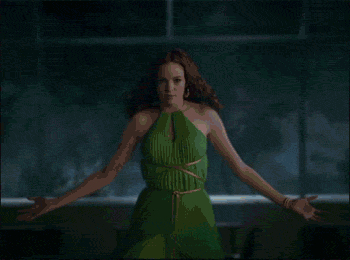
Just, NO!
Overall, a wonderful film that you should give a watch, even if Disney isn't your thing. :)
1997-
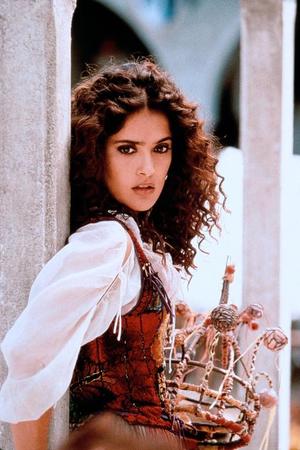


Another one of my absolute favorite adaptions(tied with the 1982 version)!!! :D I remember watching it for the first time and LOVING it!! :D In fact, it was the first film adaption I ever saw(I watched it before I started the book) and I was SOOO impressed with it and I knew I'd love the book. I already knew it wasn't completely book accurate, but the story was so engaging, and the character's so wonderfully done, that even though the story wasn't right, the film contained the spirit of the book perfectly!
First off, Richard Harris(the guy to play Dumbledore in the first two Harry Potter films; kind of weird seeing him completely hairless XD) has to be one of the BEST Frollo's ever! He was just so perfect at playing the character, like Derek Jacobi, and was able to balance the depth and good/bad parts of the character with such sympathy that you are able to find him quite pitiable in the end(and he was actually a Priest in this one too, so YAY!). I loved how they showed his torment over finding himself attracted to Esmeralda- it was, actually, the best I've seen of that to date, it was just so raw and real. His reaction to seeing Esmeralda dancing was amazing(so glad they showed it like they did- great meaning). And the scenes where he's whipping himself are an excellent and wonderful usage of symbolism and showing instead of telling- I especially liked the one where he whipped the statue and then fell to his knees in an almost-repentance- the first step in an almost-perfectly executed showing of falling into madness. I was also very happy that they included various scenes from the book that are often left out of other film versions. The foundling scene is a good one and, while not as good as it is in the book, shows the kind side of Frollo which some other portrayals have left out. It even had a scene really close to the cell/confession part, and it's possibly one of the best(so perfect!), even if it isn't in a prison cell(it's outside). The scene was so well acted and so well written that it gave me chills watching it for the first time. And on top of all this amazing-sauce, there are even lines taken directly from the novel which were very impact-full and said perfectly(such as the cassock quote, the paragraph regarding "the least of her smiles", bursting heart, etc), which, looking back as I was reading, made me so happy. I know many people didn't like his performance, but his character really struck me the first time I saw it and it still does, even though I've read the book.
Salma Hayek, while also too old(but then Richard Harris is a lot older than the character, so it's okay), is a very good Esmeralda, and looks exactly how I'd imagine her if she'd been an older individual in the book. Her acting is, for the most part, really good, though it is a tad weak in spots(but it's good where it counts and that's what matters). And she's very beautiful, so it actually makes sense why several people would be instantly attracted to her like they are in the story. I also liked her more assertive side in this film, as well as the inclusion of her knife, which she uses, for the most, quite practically(I think it was a good idea, since they were having an older actor playing the role, to mature her a bit instead of trying to make her act like a teenager). Even though they have her like Gringoire in this version(yet again), it works better because, number 1 Gringoire is totally different from his novel-counterpart, while at the same time not becoming to overly/annoyingly heroic(and is very easy to like; kind of reminded me of one of the barricade boys in Les Miserables) and number 2, the whole Phoebus sub plot is left out. Overall, she has really great chemistry with the rest of the cast and I'm happy with what they did with her character here.
This Quasimodo, played expertly by Mandy Patinkin(My name is Inigo Montoya, you killed my father, prepare to DIE! XD), has to be one of the best to play this role. He is sympathetic without straying too far from the book's portrayal of him, and the acting is just perfect with him all the way through. I also loved how the relationship between Quasimodo and Frollo was addressed in this film; whilst it is usually overlooked, this one gave it quite a lot of focus; in fact, one of the most poignant presenting of it is how they act towards each other over the course of the story. At the beginning, when Frollo is still sane and in control, he is like a parental figure if sorts to Quasimodo, towering, overbearing, and when Quasi was hurt, Frollo ended up holding him like one would a child. However, as we go through the film, we see Quasimodo become more independent(thus, becoming an adult), while, at the same time, Frollo slips further and further away from the grown man we see at the beginning until, at the end, we see Quasimodo holding Frollo, the parent-child roles reversed as Frollo has, through his inability to cope, been reduced to a lashing-out child. This whole switch-around was one of my favorite parts of the film; very powerful.
Unlike most film versions, I don't really have that many complaints about the film, though I would have, of course, liked to have seen more of my favorite characters, and had it be closer to the actual content of the book; it was different enough to make the deviations from the plot not-uncomfortable and close enough for lovers of the book, like myself, to enjoy it.
Here's the link for the entire film! :D This would definitely be a film I'd recommend if you are new to the story. :D
Overall, after reading both of Victor Hugo's most famous works, I now want to read all of his other books! He is definitely one of the best authors I've come across and one of my top three 'classic' writers(the other two being J.R.R. Tolkien and C.S. Lewis). :D Now, if you haven't read Les Mierables of Notre-Dame de Paris, GO DO SO!!! NOoOoOW!!! XD




I kind of skimmed through the spoilers parts about book, but it does sound intriguing. I do remember watching the Disney animated version when I was a kid, although I do not remember that much about it. Great review! :D
ReplyDelete-James
Yeah, it's kind of long. I agree, it is, I think you'd like it :D.
DeleteI was actually surprised with how good the Disney version was, definitely one of my favorites from them.
Thank you! :D
This was a really cool post! I liked reading about your comparison of the various film adaptations of the book. I've watched Disney's version since I was a little kid so I've seen it lots of times and I LOVE IT. You're right, the music is so beautiful and grand...it's so good :)
ReplyDeleteThank you! :D Glad you enjoyed it! :D. Definitely, it's such a good movie!! :D I really enjoyed watching it, so good! :D And YES the music!!
DeleteWow, what an in-depth discussion of Notre Dame de Paris! It' looks like you've really done a good job handling the subject. I especially like your attention to Frollo's character- he appears in a much more ambiguous light in the book than he does in most film adaptions, which I think says a lot about modern culture as a whole- most people need a bad guy, without any redeeming features. Though you can see that changing quite a bit in movies (i.e.) the sympathetic portrayal of Loki in both Marvel movies in which he appears and the sympathetic portrayal of Khan in Star Trek: Into Darkness.
ReplyDeleteI was really impressed by your discussion of film adaptations- I've only seen the Disney adaptation. As a kid, I loved that movie- in fact, it's up there with my childhood favorites like Neverending Story and Princess Bride. It's pretty dark for a Disney movie, which I think is precisely why I liked it. I remember being very uncomfortable with Frollo's big song "Hellfire" though- too creepy for my taste!
The 1997 adaptation looks really good- I may check it out.
Haha, I too am one of those weird people who'd rather visit Notre Dame! I actually had a friend who was in France this summer- he got to attend Mass at Notre Dame!
Definitely one of those things I want to do before I get much older.
This is just an amazing review of both the book and the films- you've really delved into the story! I enjoyed reading it!
Oh and I like the reaction GIF you used for the Disney sequel (which just sounds like a big NO)!
Why, thank you very much! Glad you enjoyed reading it! :) I agree, that definitely is the case(and yes, it does seem to be changing, what with those characters you mentioned as well as the villains in OUAT, and other shows I have watched being shown in a sympathetic light; I'm hoping someone will make another film and have it be closer to the book).
DeleteGreat! I agree, it's really well done; I wish I'd watched it as a kid as well. I agree, I love dark stories! They are typically the best written and the most interesting. Though, I have to agree, Hellfire would have probably have weirded me out as a kid as well.
Yes, you definitely should! :D It's a really good adaption and I think you'd really enjoy it.
Great! :D Glad to meet another person like that! :D Wow, so lucky, that's awesome! That's something I'd love to do as well.
Thank you very much!! :D Thank you for reading it! :D
Thanks! XD I haven't seen the sequel, but I agree, it's a big NO!
That's interesting, I didn't know there wasn't a main character. The Disney movie sounds really cool. Glad you have enjoyed this so much. :)
ReplyDeleteThanks!! :D I didn't know either(due to the English title), but I thought it was an interesting way to go. It is really cool, if you get the chance to watch it, I hope you like it. Thank you!! :D
Delete